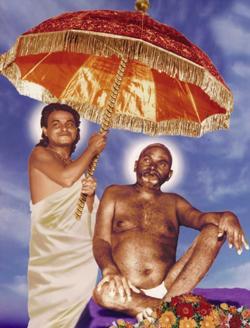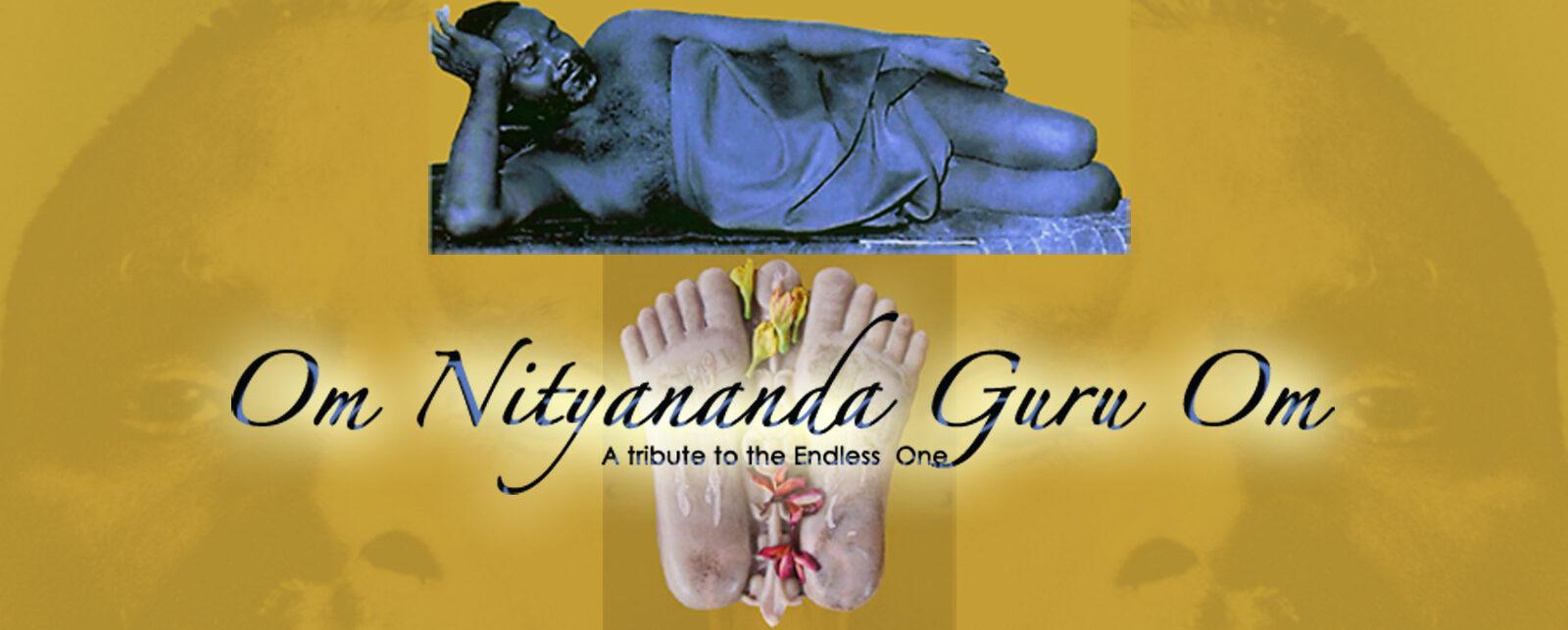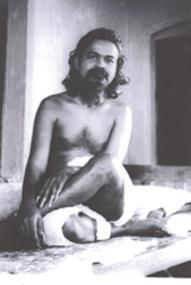Shaligram Swami
Shaligram Swami took the vow of monkhood in the Narayana Ashram in South India. At that time, he was named Dayanand Saraswati. After he met Bhagawan Nityananda, he was renamed as Shaligram Swami. The shaligram is a dark black oval-shaped pebble found on the banks of river Ganges. The shaligram stone is considered to be infused with the power of Lord Shiva and Lord Vishnu. Shaligrams are often offered in temples where they are placed on the Puja. Even if there is statue of a deity in the temple, it is the shaligram which is said to attract the Shakti of Shiva and Vishnu to that place. For this reason, people have come to worship the shaligram stone. Swamiji once said, “The name Shaligram is not my surname, it is a responsibility bestowed on me by Bhagawan Nityananda. The Shakti of Lord Shiva and Lord Vishnu fuse in Shaligram.”
The Sign
Through your accrued spiritual merit and your love for God, you cross paths with a Siddha Guru. This happens when the time is right, and without any struggle. If you love God intensely and your yearning is true, the Guru will definitely come. Keshav Apte was Shaligram Swami’s chief disciple. He was lovingly known as Appa. From his childhood, Appa used to have dreams in which he saw a huge bright pillar inside his being. This pillar used to merge in the Ajna Chakra between his eyebrows. He had been told that the day he meets his Guru, that dream would stop. So, he was now restless to meet his Guru.
One day, Appa decided to visit Shaligram Swami at his Mahul Ashram in Mumbai. As he was climbing the stairs he heard the beautiful voice of Swamiji saying, “Keshav, please come. Nityananda, you and I have been associated for the past five lives. Now, do not again have a tussle with me.” Now, Keshav had never met Swamiji but Swamiji welcomed him by his name. Appa entered the room and first bowed to the photo of Bhagawan Nityananda. Then he placed his forehead at the feet of Shaligram Swami and said silently to himself, “From today I shall call you my God. You are my Atmaram. Not to question! I shall ever remain in obedience to you. What is desired by You is acceptable to me. Thy Will be done.” He said this silently in his heart. On that night that Appa met Shaligram Swami, his dream of the huge bright pillar stopped. Appa realized that he had met the his Guru.
Throughout his years as Shaligram Swami’s disciple, most times Appa spoke to Swamiji inwardly, through his heart. And Swamiji, knowing what was in Appa’s heart would then answer him and fulfill his prayers. This is how Keshav Apte met and served his Guru, Shaligram Swami. Their relationship occurred by the Grace of Bhagawan Nityananda. Appa set a perfect example of Ananya Sharanam, total and unconditional surrender to the Master.
Once you hold on to the feet of your Guru, the Master is connected to you eternally. This is the perfect relationship. The Sadguru will never let you go or let you down. Your Devotion and Surrender is the guarantee.
Encounters With Shaligram Swami
The Oath
Under the direct order of Bhagawan Nityananda, Shaligram Swami had maintained an oath of silence (mauna vratha) for three years. By instruction of Baba, Swamiji was to complete this oath by breaking his silence at the feet of Bhagawan Nityananda in Ganeshpuri. He was to do this by uttering the name of Baba at his feet. On his journey to Ganeshpuri, Swamiji visited the Vajreshwari Temple to have darshan of the Devi. By chance, Keshav and a friend were standing at the foot of the hill on which the temple was located. They heard about this ceremony where Swamiji was to break his silence and they decided to attend it.
It was getting late and many for Shaligram Swami’s devotees had gathered in anticipation of his arrival. Soon a vehicle came to a stop near the steps leading up to the temple. Swamiji stepped out of the car. His hair and beard were long. He stood about five feet tall with a wheat-colored complexion and a very divine face. He stared at Appa and beckoned him. When Appa went by his side, Swamiji arranged for their photographs to be taken together. Shaligram Swami then insisted that Appa accompany him to Ganeshpuri for the ceremony.
The Lunch
Keshav Apte was living in Thane which is quite far from the Mahul ashram. One day while at the ashram, Shaligram Swami told Appa, “Keshav, tomorrow we are coming for lunch at your house.” Keshav, although very poor, spared no effort and expense to prepare the lunch. The next day, it was already noon and there was no sign of Swamiji. Appa then realized that he had forgotten to give his address to Swamiji and no one in the ashram knew where he lived. He decided he better go to the ashram to get Swamiji. As he stepped out of his house, he found Shaligram Swami standing in front of his door!
Holy Basil Leaves
During festivals devotees used to bring garlands of flowers for Bhagawan Nityananda. Heaps of flowers used to collect around his chair and at his feet. One day Appa brought a garland for Baba made from basil leaves. When Keshav offered this garland to Baba, Shaligram Swami said, “Keshav. Heaps of flower garlands are offered to Bhagawan, but nobody offers basil leaves. Basil leaves are holy. They represent true love. You indeed truly love him.”
Appa said “Tulsi leaves (basil leaves) represent true love. In the garden of your heart sow the seeds of the basil plant and pour water of love on it. Love shall make it grow into a beautiful plant with bright tender leaves and seeds. It shall give off a refreshing aroma which shall bring peace and make your mind calm. Offer these leaves, grown out of your love, at the feet of God.”
Desireless offerings
Appa was a perfect disciple. He cultivated unconditional love for his Guru. He only wanted what his Acharya had to give him, the ultimate state of Liberation. Event though Appa was poor and deprived in every respect, he desired nothing else. He knew that whatever he really needed, his Gurudev would provide. In this way, Appa became the fountainhead of Unconditional, Divine Love. He remained true to his word, “Thy Will be done.”
In India, it is customary that people make offerings to saints and temples. This practice is called Dakshina. When done as an offering of Love for God and the Acharya, without any other motive or desire, Dakshina is a spiritual practice that is its own reward. It cultivates Devotion which attracts God’s Grace. Unfortunately, there are those who don’t understand this and, instead, use Dakshina as a means to bargain with God for the fulfillment of their own long list of personal desires.
On November 30th of every year, the Mahul Ashram, established by Shaligram Swami in honor of Bhagawan Nityananda, hosts a celebration of Nityananda Baba’s birthday. This practice was started by Shaligram Swami 58 years ago. During this celebration many disciples make offerings in the form of bags of rice, cereal, sweets, etc. Swamiji used to hold a Bhandhara on that day and the whole village used to come and partake of the blessed food.
Shaligram considered Bhagawan Nityananda to be his Lord Rama and he considered himself to be Lord Hanuman (Lord Rama’s devoted disciple). On every 30th of November Lord Rama (in form of a Murti of Bhagawan Nityananda) goes to the Hanuman temple at Mahul on foot. Mr. Madhav Hegde describes this event as an occasion where Lord Rama, in the form of Bade Baba, visits his disciple Shaligram (as Hanuman). It is a rare example of God visiting His devotee. The chief deity of Mahul village is Lord Hanuman and there is a small temple dedicated to him at the entrance of the village. People carry the Guru’s padukas (sandals) on their heads in the morning. In a grand procession, while singing bhajans (devotional somgs), they take them from the Mahul ashram to the Hanuman temple. In the temple the silver padukas are received and worshipped.
In the evening Lord Hanuman (in the form of a Murti of Shaligram Swami) takes his Guru Nityananda back to the ashram in great pomp and gaiety. Both Murtis are placed on a palanquin which is accompanied by music and dancing people. Fire crackers are set off on the way as the procession winds its way in the small lanes of the village. The streets and homes are decorated with colorful lights. At each house, Bhagawan is received and Arathi (waving of lights) is performed. People are dressed in their best clothes and there is celebration in every house. The village thus takes on a festive look. The only known place where the birthday of Bhagawan Nityananda is celebrated is at Mahul.
Shaligram Swami never ate any of the Bhandhara food from this celebration. Appa was hurt to know that Swamiji did not eat from the offerings of food brought to him for the Bhandhara. During one such celebration, in his heart Appa was saying, “I wish you too would eat today.” When most of the devotees left and Appa went to greet Swamiji, Swamiji told his attendant, “Jaghannath. Please lay two plates for Prasad.” From one of the plates Swamiji filled his mouth full of food. He then said to Appa playfully, “Come on. Start eating.” Appa was happy that Shaligram Swami heard what he had uttered in his heart.
After they finished the meal, Swamiji said, “One who brings fulfillment (siddhi) to desire (sankalpa) is God. Some people visit me and they make offerings simply to fulfill of their own desires. So many desires, are made in their offerings to me. When it is the right time, I can only fulfill those desires which are good and in their best interest. But if I eat from the offerings of those people, I am obligated to deliver their every desire immediately. It is for this reason that I avoid partaking in any of the their offerings. Please understand that if you make an offering without any expectation, I will very gladly eat any day, any time. That’s my promise.” From that day on, Appa used to carry a small food box with a meal for Swamiji. He did not have any personal desire attached to this offering of food. He just wanted Swamiji to get nourishment. Appa quietly left the food for Shaligram Swami and Swamiji used to immediately open the box and eat happily.
Now, observing this, one of Appa’s close relatives told Appa, “Tomorrow I will bring a food box for Swamiji.” Appa knew that his relative was doing this simply because he wanted blessings for a new car. Even so, he kept quiet. When the man placed the food box in Swamiji’s hands, Shaligram Swami said, “So, you desire a car?” After saying this, Swamiji immediately distributed the food brought by this man to others, without himself eating it.
Shaligram Swami was completely attuned to the needs of his disciples and was able to discern their needs without them being voiced. For example, Keshav Apte loved mangos. Every year he used to offer the first mango of the season to Shaligram Swami. He would not eat mangos unless Swamiji ate the mango first. If Swamiji didn’t eat the mango, Appa refused to eat mangos for the entire season. During one particular mango season, Appa was not able to visit the Mahul Ashram to offer the first mango to Swamiji. So, Appa decided not to eat any mangos that season. Shaligram Swami then sent a message to him. “Inform Appa that I have eaten mangos and now he can eat too.” Swamiji granted Appa’s wish. In this way, their hearts were always connected.
The Coin
If your only desire is to merge with God, the sincerity of your desire will be tested. This test sometimes manifests through the temptation to acquire objects that you don’t really need, or to acquire objects that will tempt you to forget God. If, under the force of temptation, you can still say “I love and desire nothing but you, my Lord,” then you are His, now and forever. This is what Lord Krishna has said. It is also what Jesus Christ prayed for.
Appa was repeatedly tested by Shaligram Swami. He always got through his tests with flying colors. Even though Appa was very poor and had nothing, he desired nothing but God. He belonged to God and God belonged to him.
In one particular year, a wealthy devotee had promised to pay for the rice needed for the Bhandara on Bhagawan Nityananda’s birthday celebration. As the 30th of November approached, there was no sign of the rice or that man and there was no money in the Ashram to make the purchase. Keshav asked Swamiji, “Should I go and ask that devotee to make good on his commitment?” Shaligram Swami answered, “No dear. It must be that he is not be in a position to bear the cost. We should never put anybody in such a predicament. Here. Take this coin and go to the grain market.* Buy the rice that we need for the festival.”
Without even blinking, Appa put that coin in his pocket and left for the market. So strong was his faith in his Guru that it just did not occur to him how he was going to purchase some 700 kgs of rice with just one rupee coin! Once at the market, he gathered all that was needed and asked the total. The shopkeeper told him the total cost. Appa put his hand in his pocket and was not surprised to find that, with the coin, was the exact amount needed to pay for the rice. He loaded the bags of rice into a truck and returned to the Mahul Ashram. Bowing down to Swamiji, he gave the coin back. Swamiji said, “You are returning the coin!? Keshav, what’s the matter with you? Are you aware that if you keep this coin in your pocket, you will never have shortage of money in your whole life?” As usual, Appa replied silently in his heart, “I desire only You,” and refused the coin.
*Bhatbazar is a frequented market near Majid Bunder in Mumbai.
Spotless
The mundane exchange between Guru and Disciple is often a metaphor and symbolic of a deeper meaning and message. Shaligram Swami wore the ochre cloths of a monk only once a year on a particular day. Otherwise he always wore a white cloth around his body, tied up in a knot at his neck. Once, Appa presented him with a soft white cloth. Swamiji said, “I do not like it if there is any spot on it. You will always have to present me with a spotless one.” There is a great meaning behind this statement. It meant that Appa’s Love for Swamiji should be without taint. His Love should be completely pure and unconditional.
Grace and Blessings
One day a lady visited Mahul Ashram and fell at the feet of Shaligram Swami. She wept for a long time and expressed all her pain and suffering to Swamiji. She went on for a good while. Shaligram Swami kept quiet and said nothing to give her any comfort. At one point Appa was feeling that Swamiji should show the woman some concern by speaking some words of comfort to her. No sooner had this thought flashed into his mind than Swamiji said, “Nobody leaves this place empty-handed Keshav. Within the next two days, she shall return to confirm that her difficulties have been overcome and you shall witness this.” It happened exactly as Shaligram Swami said it would.
Golden Sandals
Shaligram Swami derived the power to serve his disciples from his own Guru, Sri Bhagawan Nityananda of Ganeshpuri. Swamiji’s love for Bade Baba (Bhagawan) was unparalleled and unconditional.
One day a devotee visited the ashram and presented Shaligram Swami with forty-four thousand rupees. Swamiji called a goldsmith and used the money to have a silver alter designed with all items needed for daily Puja. He also purchased gems and a pair of diamond-studded golden sandals. Swamiji placed the sandals in a bag and left for Bhagawan Nityananda’s Ganeshpuri ashram. When he arrived at the ashram, he placed the golden sandals in front of Bhagawan Nityananda and stood aside in reverence. Bhagawan immediately put his feet in the sandals and Shaligram Swami held a beautiful umbrella over Bade Baba’s head, the way one holds an umbrella over a king. After all, Bhagawan Nityananda was the King of kings. This was a most beautiful sight. It was witnessed by Appa and photographed by Suvarna. This event occurred 12 years after the annual birthday celebrations on November 30th began each year at the Mahul Ashram.

Even today, one can see this photo where Bade Baba sits like a King and Swamiji holds the umbrella with his smiling face and eyes filled with love and satisfaction. This was indeed a rare honor. This photo, along with the photo taken with Shaligram Swami bowing to Bhagawan Nityananda on the day he broke his silence in Bhagawan’s presence; When these photos are placed in one’s home, they attract the Grace-bestowing power of Bhagawan Nityananda and Shaligram Swami.

